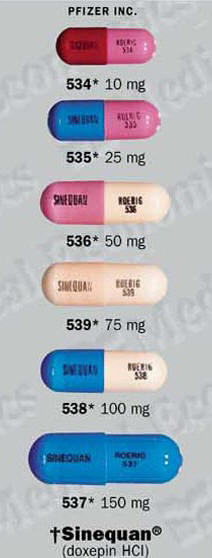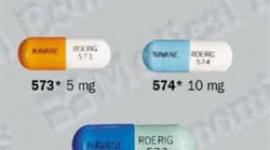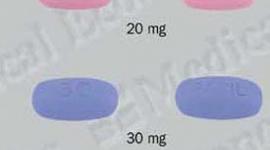Sinequan (Doxepin) Patient Information
Find out why Sinequan is prescribed, side effects using Sinequan, Sinequan warnings, effects of Sinequan during pregnancy, more - in plain English.
Brand name: Sinequan
Generic name: Doxepin hydrochloride
Pronounced: SIN-uh-kwan
Sinequan (Doxepin) full prescribing information
Why is Sinequan prescribed?
Sinequan is used in the treatment of depression and anxiety. It helps relieve tension, improve sleep, elevate mood, increase energy, and generally ease the feelings of fear, guilt, apprehension, and worry most people experience. It is effective in treating people whose depression and/or anxiety is psychological, associated with alcoholism, or a result of another disease (cancer, for example) or psychotic depressive disorders (severe mental illness). It is in the family of drugs called tricyclic antidepressants.
Most important fact about Sinequan
Serious, sometimes fatal, reactions have occurred when Sinequan is used in combination with drugs known as MAO inhibitors, including the antidepressants Nardil and Parnate. Any drug of this type should be discontinued at least 2 weeks prior to starting treatment with Sinequan, and you should be carefully monitored by your doctor.
If you are taking any prescription or nonprescription drugs, consult your doctor before taking Sinequan.
How should you take Sinequan?
Take this medication exactly as prescribed. It may take several weeks for you to feel better.
--If you miss a dose...
If you are taking several doses a day, take the missed dose as soon as you remember, then take any remaining doses for that day at evenly spaced intervals. If it is almost time for your next dose, skip the one you missed and go back to your regular schedule. Never take 2 doses at the same time.
If you are taking a single dose at bedtime and do not remember until the next morning, skip the dose. Do not take a double dose to make up for a missed one.
--Storage instructions...
Store at room temperature.
What side effects may occur using Sinequan?
Side effects cannot be anticipated. If any develop or change in intensity, inform your doctor as soon as possible. Only your doctor can determine if it is safe for you to continue taking Sinequan.
The most common side effect is drowsiness.
- Less common or rare side effects may include: Blurred vision, breast development in males, bruises, buzzing or ringing in the ears, changes in sex drive, chills, confusion, constipation, diarrhea, difficulty urinating, disorientation, dizziness, dry mouth, enlarged breasts, fatigue, fluid retention, flushing, fragmented or incomplete movements, hair loss, hallucinations, headache, high fever, high or low blood sugar, inappropriate breast milk secretion, indigestion, inflammation of the mouth, itching and skin rash, lack of muscle control, loss of appetite, loss of coordination, low blood pressure, nausea, nervousness, numbness, poor bladder control, rapid heartbeat, red or brownish spots on the skin, seizures, sensitivity to light, severe muscle stiffness, sore throat, sweating, swelling of the testicles, taste disturbances, tingling sensation, tremors, vomiting, weakness, weight gain, yellow eyes and skin
Why should this drug not be prescribed?
If you are sensitive to or have ever had an allergic reaction to Sinequan or similar antidepressants, you should not take this medication. Make sure that your doctor is aware of any drug reactions that you have experienced.
Unless you are directed to do so by your doctor, do not take this medication if you have the eye condition known as glaucoma or difficulty urinating.
Special warnings about Sinequan
Sinequan may cause you to become drowsy or less alert; driving or operating dangerous machinery or participating in any hazardous activity that requires full mental alertness is not recommended.
Notify your doctor or dentist that you are taking Sinequan if you have a medical emergency, and before you have surgery or dental treatment.
Possible food and drug interactions when taking Sinequan
Alcohol increases the danger in a Sinequan overdose. Do not drink alcohol while taking this medication.
Never combine Sinequan with drugs known as MAO inhibitors. Medications in this category include the antidepressants Nardil and Parnate.
If you are switching from Prozac, wait at least 5 weeks after your last dose of Prozac before starting Sinequan.
If Sinequan is taken with certain other drugs, the effects of either could be increased, decreased, or altered. It is especially important to check with your doctor before combining Sinequan with the following:
Antidepressants that act on serotonin, such as Prozac, Zoloft, and Paxil
Other antidepressants such as Elavil and Serzone
Carbamazepine (Tegretol)
Cimetidine (Tagamet)
Clonidine (Catapres)
Flecainide (Tambocor)
Guanethidine (Ismelin)
Major tranquilizers such as Compazine, Mellaril, and Thorazine
Propafenone (Rythmol)
Quinidine (Quinidex)
Tolazamide (Tolinase)
Special information if you are pregnant or breastfeeding
The effects of Sinequan during pregnancy have not been adequately studied. If you are pregnant or planning to become pregnant, inform your doctor immediately. Sinequan may appear in breast milk and could affect a nursing infant. If this medication is essential to your health, your doctor may advise you to discontinue breastfeeding your baby until your treatment is finished.
Recommended dosage
ADULTS
The starting dose for mild to moderate illness is usually 75 milligrams per day. This dose can be increased or decreased by your doctor according to individual need. The usual ideal dose ranges from 75 milligrams per day to 150 milligrams per day, although it can be as low as 25 to 50 milligrams per day. The total daily dose can be given once a day or divided into smaller doses. If you are taking this drug once a day, the recommended dose is 150 milligrams at bedtime.
The 150-milligram capsule strength is intended for long-term therapy only and is not recommended as a starting dose.
For more severe illness, gradually increased doses of up to 300 milligrams may be required as determined by your doctor.
CHILDREN
Safety and effectiveness have not been established for use in children under 12 years of age.
OLDER ADULTS
Due to a greater risk of drowsiness and confusion, older people are usually started on a low dose.
Overdosage
- Symptoms of Sinequan overdose may include: Agitation, coma, confusion, convulsions, dilated pupils, disturbed concentration, drowsiness, hallucinations, high or low body temperature, irregular heartbeat, overactive reflexes, rigid muscles, severely low blood pressure, stupor, vomiting
If you experience any of these symptoms, seek medical attention immediately. An overdose of this drug can be fatal.
Sinequan (Doxepin) full prescribing information
Detailed Info on Signs, Symptoms, Causes, Treatments of Depression
Detailed Info on Signs, Symptoms, Causes, Treatments of Anxiety Disorders
APA Reference
Staff, H.
(2009, January 3). Sinequan (Doxepin) Patient Information, HealthyPlace. Retrieved
on 2024, April 25 from https://www.healthyplace.com/other-info/psychiatric-medications/sinequan-doxepin-adapin-patient-information


